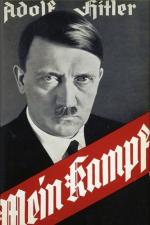
|
| Name: _________________________ | Period: ___________________ |
This test consists of 15 multiple choice questions and 5 short answer questions.
Multiple Choice Questions
1. Hitler believes that a proper pre-war policy should be what?
(a) The encouragement of free trade.
(b) The acquisition of more land in Europe.
(c) The preserving of the character of the German people.
(d) The use of tariffs on trade between Germany and other countries.
2. What does Hitler find that many other parties are doing?
(a) Copying and adopting his party's programs.
(b) Sabotaging his party's programs.
(c) Destroying his party's programs.
(d) Slandering his party's programs.
3. Are the successes of coalitions usually lasting?
(a) Sometimes.
(b) No.
(c) Yes.
(d) Maybe.
4. What would be the purpose of the National Socialist trade union?
(a) To represent the occupational interests of its members.
(b) To be used as a tool of class struggle.
(c) To convince others to join the union.
(d) To control the workers.
5. Hitler sees educating the German population in what as the way to achieve this goal?
(a) Foreign policies.
(b) German history.
(c) Political history.
(d) Racial awareness and breeding.
6. What tradition is gone after the war?
(a) The tradition associated with the old Reich.
(b) The tradition of believing all men are equal.
(c) The tradition of holding elections.
(d) The tradition of allowing women to vote.
7. What does Hitler think of the German leaders?
(a) They are kind and loving.
(b) They are pathetic and weak.
(c) They are unintelligent and uneducated.
(d) They are strong and powerful.
8. According to Hitler, should the National Socialists have a presence in the trade union movement?
(a) Yes.
(b) Maybe.
(c) Some.
(d) No.
9. What disrupts the balance of the three groups of people?
(a) The war and high casualties.
(b) The rise of Marxism and other socialist orders.
(c) The end of the monarchy and change in political views.
(d) Poverty and starvation.
10. When is the National Socialist German Workers Party dissolved?
(a) On November 9, 1913.
(b) On November 9, 1933.
(c) On November 9, 1923.
(d) On November 9, 1903.
11. What type of people come to be the leaders and the masses follow them?
(a) The best.
(b) The worst.
(c) The most intelligent.
(d) The most compassionate.
12. What does Hitler know they need to provide the members of the Party?
(a) Food and drink.
(b) Money.
(c) Shelter.
(d) A common bond.
13. In a folkish state, what are the issues?
(a) Understanding of the culture.
(b) Fluency in German.
(c) Wealth and education.
(d) Race and nationality.
14. Since the 1918 end of the monarchy, what has the government been in regards to foreign affairs, according to Hitler?
(a) Fairly weak.
(b) A success.
(c) A failure.
(d) Somewhat successful.
15. How does Hitler believe terror should be fought?
(a) With love.
(b) With peaceful protests.
(c) With traditional methods.
(d) With terror.
Short Answer Questions
1. What is the purpose of pre-War foreign policy?
2. The first part in the battle is the __________________ of the existing state of affairs.
3. What would be would be a rallying point against Marxism?
4. Of what does a federated state consist?
5. Does Hitler feel that trade unions can be done away with?
|
This section contains 510 words (approx. 2 pages at 300 words per page) |

|




